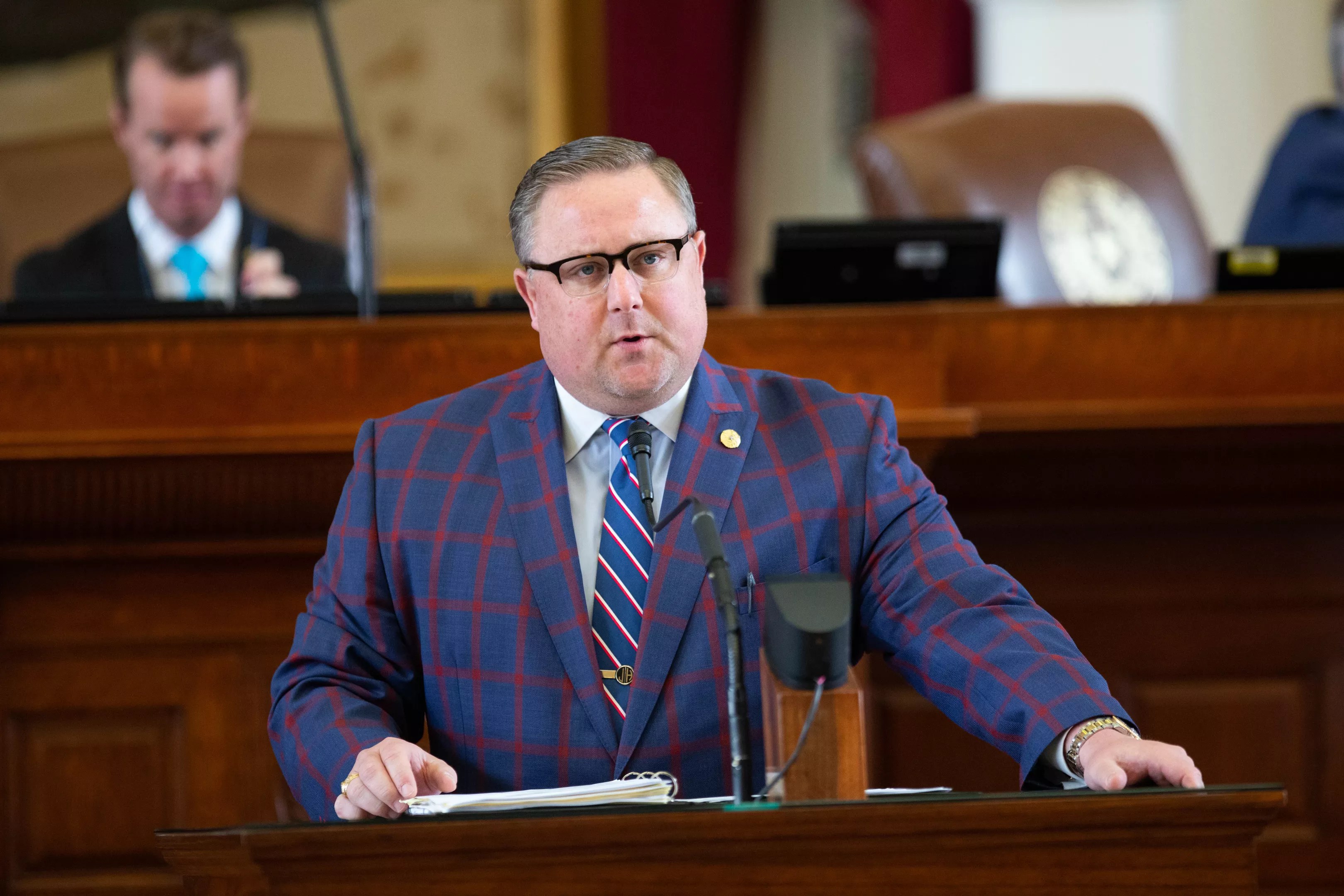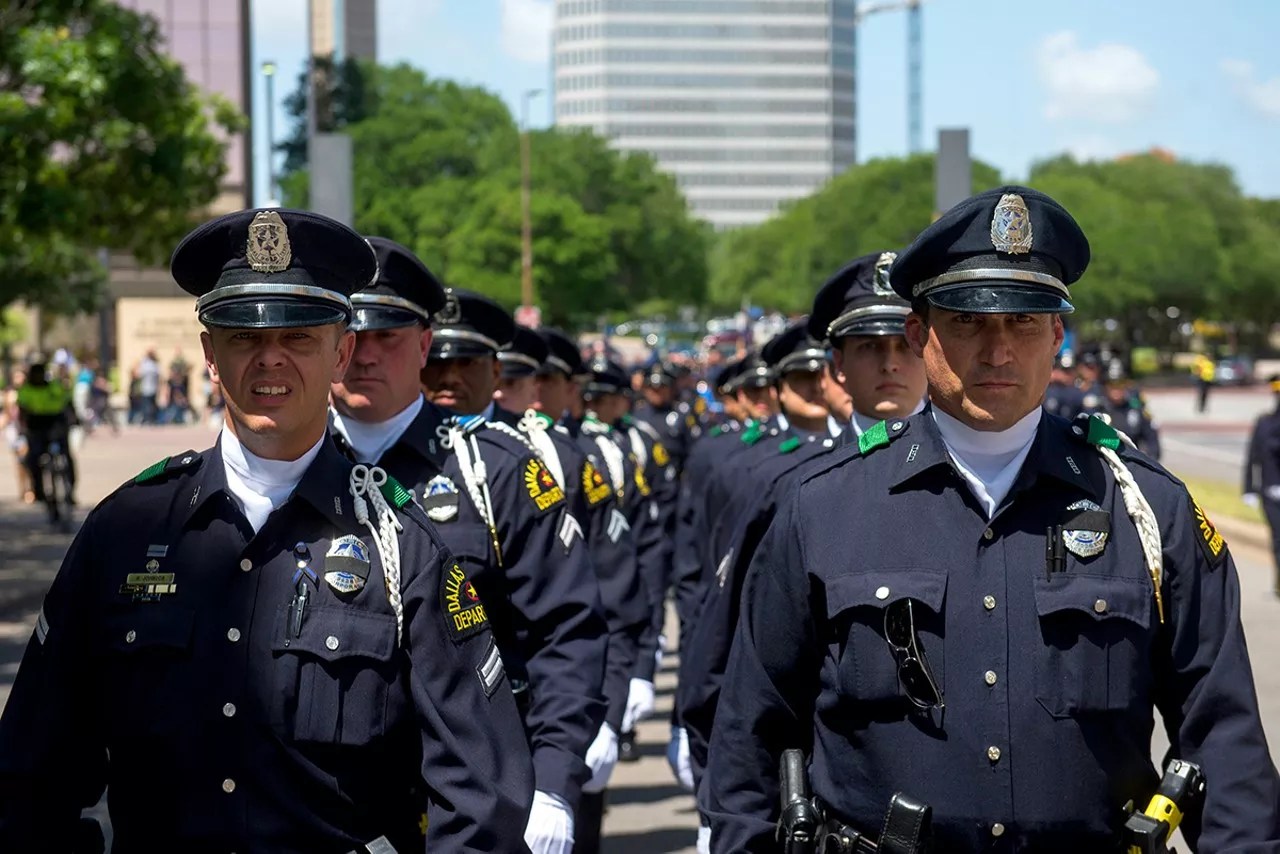
illustration by Sarah Schumacher

Audio By Carbonatix
Gov. Greg Abbott had big plans. It was Feb. 1, and he took to the podium prepared to deliver his annual State of the State address. He wanted Texans to know the state was “brimming with promise,” words that must have rang hollow to those who were still shell-shocked from the U.S. Capitol riot less than a month earlier. Still, he vowed that this year’s legislative session would provide relief.
Just three weeks earlier, state lawmakers had convened the 87th Legislature. And another two weeks after Abbott’s address, Texas would plummet into darkness as a deadly winter storm cut off the lights for millions across the state.
On Feb. 1, though, Abbott was busy laying out his legislative priorities. Speaking to the camera, he urged lawmakers to tackle five emergency items, including so-called election integrity bills. Among the non-emergency priorities were expanding gun rights and banning abortion.
The ground was laid for what became a historic legislative session, one that some Republicans have celebrated as the most conservative session yet.
Rockwall state Rep. Justin Holland is among the Republicans championing the session. Taking to Twitter on May 5, with only a few weeks of lawmaking left, Holland insisted that it was “perhaps the most conservative session in Texas history.”
While many liberals would begrudgingly agree with that claim, some Republican Party leaders have slammed lawmakers for not moving the needle far enough right.
**

Rockwall state Rep. Justin Holland has claimed this was the most conservative session yet
courtesy Rep. Justin Holland
On May 24, Holland apparently dressed to make history. He sported a navy and red tie and a plaid blazer. The state Senate had just passed one of his bills, all but ensuring that Texas would become a so-called Second Amendment sanctuary state. Soon, it’d be on its way to the governor’s desk.
Holland was beaming as he posed for a photo beside Republican colleagues. State Reps. Shelby Slawson and Matt Schaefer had also advanced the conservative cause this session, spearheading two of the House’s anti-abortion and pro-gun bills, respectively.
With time running out on the clock, Holland knew the 87th Legislature would be one for the books. “We have addressed a very large number of conservative priorities,” Holland told me. “And I do think it is – when the dust settles – the most conservative session we’ve ever had, certainly since I’ve been here, but I think ever.”
Gov. Abbott celebrated Holland’s Second Amendment sanctuary bill on Twitter, writing it “would protect the Lone Star State from any new federal gun control regulations. Don’t tread on Texas.” The Senate had also approved a compromise on Schaefer’s so-called constitutional carry bill, which would allow Texans to carry a handgun without a license. And the previous Wednesday, the Senate’s “heartbeat bill” was signed into law, effectively banning abortions statewide. Slawson had authored an identical companion bill in the House.
On top of tending to regular responsibilities, such as passing the state’s budget, the Legislature also had the once-in-a-decade redistricting process to contend with. Last year, state lawmakers expected they’d have to make a grueling series of budget cuts, but the federal government helped by providing COVID-19 aid.
And a special session for redistricting will be held later this year because of a delay in receiving census data. That further freed up the Republican-majority Legislature to focus on issues important to its base.
Soon, Holland said, conservative lawmakers had passed religious liberties and bail reform bills, plus those pertaining to “election integrity”- or, as Democrats call it, “voter suppression.” The way Holland sees it, those were all major victories and conservative lawmakers had delivered the goods for Texas voters who resoundingly reelected them in November, despite Texas Democrats’ hopes of reclaiming a House majority. Instead, they didn’t pick up a single seat.
Holland isn’t the only one who thinks this was the most conservative yet. On May 11, Texas Tribune CEO Evan Smith echoed the sentiment in a tweet: “this is my fifteenth #txlege and it is, hands down, not even close, the most conservative session i’ve ever seen,” he said, along with the hashtag #electionshaveconsequences.
**

Republicans want to keep police in Texas well funded.
Brian Maschino
Last year, after a police officer killed George Floyd, a 46-year-old Black man, in Minneapolis, Black Lives Matter protests surged around the country. Activists rallied around the slogan “defund the police.” But conservative state lawmakers fought back, threatening to fiscally punish cities that slash law enforcement funding. They also pushed legislation that would make it more difficult for educators to teach about racism.
On Thursday, May 6, state Rep. Jasmine Crockett booked it up to the House mic. The Dallas Democrat had a few pointed questions for House Bill 1900’s author, and she didn’t hold back.
State Rep. Craig Goldman, a Republican from Fort Worth, had authored a bill that would punish certain municipalities that cut their police funding. The legislation would penalize cities of more than 250,000 people, including Dallas, which last year had opted to decrease its police overtime budget, though the department’s overall budget increased.
Crockett battered Goldman with questions that day, her attorney skills on full display. For her, it was personal. “Sadly enough, plenty of people haven’t been to South Dallas, where Black people are afraid most of the time because they don’t know if they’re going to get killed,” Crockett said, fighting back tears. “And instead of us doing something to protect people in this state, we decide to punish – punish people who are already suffering.” Last week, the bill passed out of the Senate.
Other Texas Democrats have also felt helpless to keep conservative legislation from advancing.
On May 11, the Texas Democratic Party slammed House lawmakers for passing Senate Bill 7, which would limit the ways Texans can cast their ballots. The bill joined hundreds like it across the country, proposals to impose tighter restrictions on voting. The wave of legislation came in response to the 2020 presidential election, which many Republicans falsely claim was rigged against former President Donald Trump.
Texas Democrats had again failed to stir up a blue wave last November, but the party’s chair, Gilberto Hinojosa, issued a scorching statement on Republicans’ “voter suppression” efforts, calling it their “only hope of staying in power.”
Even some Republicans were unhappy with the bill, albeit for different reasons. Take Allen West, chairman of the Texas GOP. He said SB 7 had been “gutted and replaced,” a fact that disappointed him, given that election integrity was a priority.
I caught up with West by phone on May 20, two days after his first grandson’s birth. He gave lawmakers credit for passing the heartbeat bill that practically outlaws abortion – an end to the “dismemberment of unborn children,” he called it – but that wasn’t enough.
West insisted the grassroots conservative base was disappointed with the Republican majority they worked so hard to elect. “When I think about some of the other things that have been wasted upon – I mean, declaring Dr Pepper the official drink of Texas or San Marcos as the official mermaid capital of Texas – I don’t think the people want those to be priority issues,” he said.
Lawmakers let die bills that would protect Confederate monuments. Important legislation regarding school choice and taxpayer-funded lobbying also fizzled out, West said. Plus, certain bills that would essentially ban gender-affirming care for transgender minors failed to make it to the finish line. “So to come out and say this was the most conservative legislative session in history for the state of Texas,” West argued, “that’s delusional, and I don’t understand why anyone would say that.”
State Rep. Holland thinks West is merely posturing for personal gain and positioning himself to run for higher office. “The Republican Party of Texas has been hijacked by a carpetbagger from Florida, and so Allen West does not represent all of the Republicans in Texas,” Holland said.
“The type of Republican I am is to work on issues that mean things to our party and mean things to our conservative values,” he continued. “[West’s] is to stoke up his base and make them think we’re not doing a good job.”
**

Gov. Greg Abbott is laying out a conservative agenda for the legislative session
Lynda M. Gonzalez-Pool/Getty Images
There’s no denying fissures within the Texas GOP have grown since West’s ascension to state GOP chair last summer.
A former Florida congressman and Tea Party favorite, West moved to Texas sometime after he was defeated by a Democrat in his 2012 bid for reelection. Since then, he’s carved a name for himself as a political firebrand and one of the governor’s greatest Republican foes. Last October, he protested against Abbott’s coronavirus restrictions outside the governor’s mansion. Legislation that would have reined in some of Abbott’s executive powers also died, West said, which was another state GOP priority.
When we spoke, West said he’d give the 2021 legislative session a “D” grade. But Thomas Marshall, a political science professor at the University of Texas at Arlington, disagrees: As of last Tuesday morning, he’d give the session, from a conservative point of view, an “A-minus.”
After holding onto a legislative majority in the 2020 election, Republicans set themselves up for success, Marshall said. They changed the Senate rules to require 18 votes instead of 19 for a supermajority, ensuring an easier route to pass conservative legislation. From there, they deftly avoided progressive legislation, such as skirting some of the provisions in the George Floyd Act, a police reform bill.
Until around a decade ago, the Texas Senate was run by more moderate Republicans, Marshall said, but some have since lost reelection or retired. The remaining Senate Republicans are a more conservative bunch, certainly more so than those of the 1990s.
But during the 2020 election, Democrats failed to gain enough ground in the Legislature, and that harmed their chances of blocking legislation they saw as particularly damaging, Marshall said. Republicans would have offered red-meat bills anyway, but this time around, it was easier to advance them.
Although politics have become increasingly polarized for some time, Marshall said, last year’s contentious presidential election and social justice protests sharply escalated the tension at the grassroots level. Republican voters expected their lawmakers to make big moves, even if they were symbolic.
Legislators already anticipated a special session for redistricting in the fall, during which officials will take census data and redraw voting districts. But the legislative session got more complicated last Wednesday, with less than a week left to go before adjournment.
Last Tuesday was the final day for the House to advance Senate bills, and as the clock struck midnight, Democratic House lawmakers celebrated: Time had run out on three of Lt. Gov. Dan Patrick’s priorities. One bill would have prevented local governments from paying lobbyists with taxpayer funds. Another would have prohibited social media giants from “censoring” Texans for their political viewpoints. The third bill was even more controversial: It would have kept young transgender athletes from playing on school sports teams that align with their gender identity.
But Patrick had one last trick up his sleeve. In a tweet last Wednesday morning, he petitioned Abbott to call a special June session to pass those priorities.
Things got even muddier late Sunday night after Democrats walked off the House floor to block the passage of SB 7, the “election integrity” bill. The move may have stalled that issue for now, but Gov. Abbott plans to add it to the special session agenda.
By and large, though, legislators like Holland are pleased – even if critics aren’t. Soon, some lawmakers will ask voters to reelect them in November 2022. “I can’t wait to go and brag on what a session we had,” Holland said. “And people that don’t think we did enough, we’ll just have to work on that next time for them.
“If they didn’t think we did a good job,” he continued, “then we don’t get to go back.”